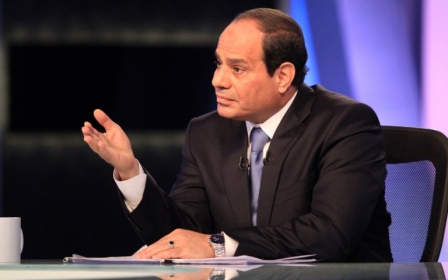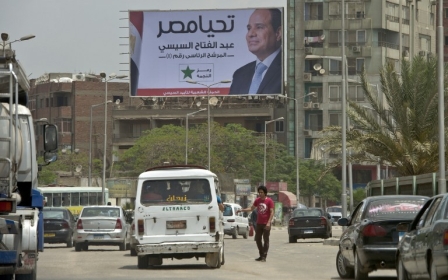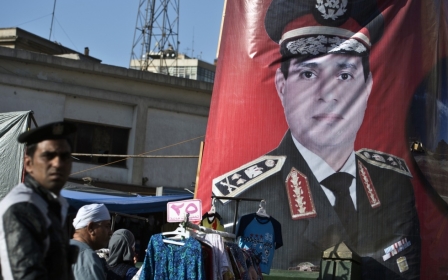Salafists navigate Egypt's political currents

In the chaotic months following the ouster of autocrat Hosni Mubarak, Egypt’s myriad political parties began to court each other in an attempt to consolidate power.
As protests continued under Supreme Council of the Armed Forces rule, it became clear that for the first time in its roughly 80-year lifespan, the Muslim Brotherhood was destined to become a ruling force within Egyptian politics.
In the aftermath, a new alliance was born. The Nour party, which was founded in 2011 as a political wing of Egypt’s Salafi movement - a highly conservative form of Sunni Islam - became uneasy allies with the Freedom and Justice party, the political arm of the Muslim Brotherhood,
Now, two years later, the Muslim Brotherhood has been banned, and in the lead up to last week's presidential election, the Nour party again found itself playing politics.
Marriages of convenience
New MEE newsletter: Jerusalem Dispatch
Sign up to get the latest insights and analysis on Israel-Palestine, alongside Turkey Unpacked and other MEE newsletters
“We were not in a normal condition where we could choose our [presidential] candidate on the basis of a complete economic and political program”, said Nader Bakkar, the spokesperson and co-founder of the Nour Party.
The choice the Nour made for the vote - former army chief and winning candidate Abdel Fatah al-Sisi - was a definitive one.
“Egypt needs in the coming four years a president who can rule the deep state institutions in a way to achieve some kind of homogeneity” Bakkar said. “[Government institutions] need real reform, under a guy who can first of all knows how to deal with [the deep state], with their procedures, with their bylaws, their internal ways of working.”
Although still a newly formed organization, the Nour party has been able to garner a sizable support base, winning a quarter of the available seats in the 2011 parliamentary elections.
The Nour party’s success reflects momentum in the Salafi movement in Alexandria. The latter was born out of a branch of the militant Islamic movement Gama'a Islameyya in the 1970s in the city. By the mid-1980s it began calling itself Dawa Salafiyya, or the Salafi Calling.
Founded on a hyper conservative movement based in literal and strict interpretation of the Koran, Salafism’s popularity has spread throughout the country since Dawa Salafiyya was formed.
In the 1990s, then president Hosni Mubarak allowed several prominent Salafi preachers and members of Dawa Salafiyya access to Egyptian satellite television channels. Mubarak wanted a non-political alternative (then the Dawa Salafiyya had no political arm) to the powerful Muslim Brotherhood.
Co-opting political Islam
Mubarak also wanted to spread the view that the state was not against Islam as a religion but rather against mixing politics with religion, as the accusation of the state being against the Islamic faith would paint the government in a very negative light for the majority of its population.
In the wake of the revolution, Egyptians who were formerly incapable of participating in mainstream politics began to form new parties. “The opening of the political arena presented a unique opportunity to become part of the institutional game” said Fadhel Khaboub, a professor at Denison University in Ohio.
In May, 2011, Nader Bakkar, Emad Abdel Ghaffour, and others formed the Nour party, Dawa Salafiyya’s political arm.
Dawa Salafiyyah created a powerful communications arm – using mosques, prayer boxes on street corners, some satellite channels and a network of charities – and in a little more than six months, it was able garner around 25% of parliament seats in Egypt’s parliament.
Despite the movement's rapid growth, critics say that the alliance with Sisi will likely have strict, but unspoken conditions. If the Nour party begins to veer from the path the military designed, the crackdown will be swift.
The controversial decision to side with Sisi and his “roadmap” divided the Nour party between those who sympathized and sided with the Muslim Brotherhood and those who didn’t.
Siding with Sisi
Although the Freedom and Justice party and the Nour Party follow political Islam, the intrinsic differences between the structures of each larger body, the Muslim Brotherhood and Dawa Salafiyya, forced a rift in between the parties.
The Muslim Brotherhood is flexible in religious matters, but extremely rigid with regard to political activity. In the Salafi movement, political activity is flexible and as a movement generally have less interest in addressing voting for a specific party, but religious practices are extremely strict.
In September 2012, infighting in the Nour party lead Dr Emad Abdel Ghaffour, the former head of the organization, to resign. In an interview with the the Washington Post, Ghaffour explained that he parted with the group to start a new political party that was inclusive for all religions. Documents published on the Nour party’s official website stated that Ghaffour was dismissed due, in part, to his appointment as an assistant to then president Mohamed Morsi.
By late 2012, the relationship between the Muslim Brotherhood and the Nour party deteriorated, and that was also the beginning of a fracture within the Nour party. After Ghaffour left, he went on to form the Watan party, another Islamist party, which is explicitly part of the Anti-Coup Alliance.
“We knew from the beginning that when we take a pure political decision outside of emotions and neglecting emotions, of course we are going to pay the price, but we are depending on the rationale and justification of our political decisions”, Bakkar said.
As Egyptians voted this week, many expressed a desire for “stability” and a calm political climate. The Nour party, in their short tenure, “is preparing to have a presence in the coming parliament that reflects its real capabilities and its philosophy to join the political group for better performance than the previous parliament”, Bakkar said.
Like the Muslim Brotherhood, Salafi organizations engage in charity, teaching trade skills and giving handouts in Egypt’s rural and poor urban areas. “Nour party engages in activities that aren’t related to the political activities, but for the absence of governmental organized efforts, a big party finds itself pushed and pressured to achieve this role”, Bakkar said. Now, they are expanding their charity program across the country. A major source of support for the Muslim Brotherhood was their charitable organizations.
Although the Nour party has had amiable relations with Egypt’s current regime, Egyptian presidents have a history of using Islamist groups to mobilize their support base and later turning against them.
Middle East Eye delivers independent and unrivalled coverage and analysis of the Middle East, North Africa and beyond. To learn more about republishing this content and the associated fees, please fill out this form. More about MEE can be found here.




